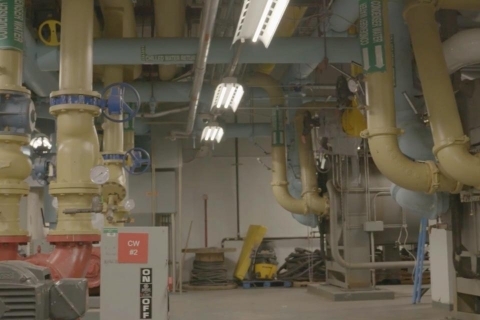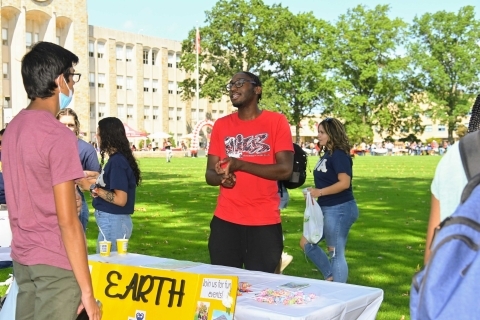
St. John’s University is taking the lead in moving toward carbon neutrality, ahead of the first of New York City’s deadlines.
Under a law enacted in 2019, New York City businesses must reduce or decrease their carbon emissions by 40 percent by 2030. St. John’s is ahead of schedule, having already reduced carbon emissions 30 percent through a series of green-energy initiatives that include pipe insulation, boiler upgrades, steam trap retrofits, and more that will save 300,000 kilowatt-hours of energy annually.
“In developing a road map for carbon reduction, we needed to employ some engineering into building infrastructure across the campus,” said Thomas M. Goldsmith, Director of Environmental and Energy Conservation, Department of Campus Facilities and Services. “In order to get to attainable targets within the time frame, some of the natural gas systems had to be made more efficient. It is largely an electrification project.”
The transformation began in February 2022 with the installation of air-source heat pumps to heat the water at Carnesecca Arena. This allows the University to shut down the gas-powered steam boilers in the arena for five months each year for an estimated savings of 69,000 therms of natural gas annually.
Other projects include the installation of a variable refrigerant flow-heat transfer system that will use electricity to shift heat from classrooms on the sunny side of Marillac Hall to colder ones as needed.

Likewise, the traditional, natural gas-fueled cooling towers at Montgoris Dining Hall are being replaced with state-of-the-art, water-cooled industrial “chillers” that use electricity to generate air conditioning. The goal of the multimillion-dollar effort is to reduce the use of fossil fuels on campus and instead focus on renewable energy sources such as electricity.
The new St. Vincent Health Sciences Center, scheduled to open in 2024, will be fully powered by electricity, Mr. Goldsmith said.
The effort comes as the University will recognize Campus Sustainability Month in October, a global initiative to inspire campus stakeholders to become ambassadors for environmental awareness.
“It’s great that St. John’s is taking the lead in sustainability efforts,” said Rosanna Jiang, a junior majoring in Legal Studies and President of St. John’s Earth Club, one of the most active student environmental groups on campus. “If this all goes well, maybe we can get other universities interested in doing something similar. We can all work together and make a change in how universities approach this topic.”
With the exception of a few years, St. John’s overall fossil-fuel use has been in steady decline since 2007, said Matthew Gallagher, Financial Business Manager, Department of Campus Facilities and Services. He expects the University to meet the 40-percent reduction threshold as early as 2027—three years ahead of the deadline.
“We are on an overall downward trend in carbon use and should be able to meet the target by 2027 or 2028,” Mr. Gallagher predicted.
Infrastructure upgrades are only part of the effort. St. John’s students have participated for years in recycling and conservation projects. They have also taken part in an energy reduction tournament called “Conserve to Serve,” Earth Week initiatives, a Campus Sustainability Day, food recovery, a food waste compost system, and more.

The Earth Club has plans for a campus cleanup day in October to be done in conjunction with the St. John’s chapter of Catholic Relief Services. Since being recognized by Student Government, Inc., in 2014, the Earth Club has held fundraisers to help victims of wildfires and other natural disasters and helped to manage the campus’s organic garden and arboretum. Produce grown in the organic garden that is not consumed at the University is donated to St. John’s Bread & Life, consistent with the University’s commitment to help the disadvantaged.
The 65 trees of the arboretum, located in the western end of the campus, store carbon in their tissues, reducing the amount released into the atmosphere. As the trees continue to grow, they will be capable of storing even more carbon.
“We are a Vincentian school that really values service and giving back,” Rosanna said. “The environment is essential to everyday life, but it’s easy to overlook the need to take care of it. In our club, we stress hands-on work and awareness.”
As the University has committed to reducing its carbon footprint, interest in environmental awareness has grown across campus. Caitie Dupre, Environmental Sustainability Chair of the St. John’s chapter of Catholic Relief Services, said stewardship of the environment on campus and at large is one of the organization’s chief priorities, consistent with Pope Francis’ appeal for action on environmental issues.
To that end, the St. John’s chapter of Catholic Relief Services hosts several sustainability forums on campus each semester. The group also sponsors several Earth Day events each April, geared toward helping students recognize how they can assist in carbon-reduction efforts at St. John’s and in their larger communities.
“The environment is one of the most important parts of our lives and one of the most overlooked issues in government,” Caitie said. “For that reason, it’s refreshing to see St. John’s take such measures to change this. It is an exciting time to be part of the University community and become part of the solution.”
Learn More about Campus Sustainability Efforts
Watch a video on the University’s Energy Master Plan.
Watch a video on student sustainability efforts.
Watch a video on student composting and food waste prevention efforts.
Related News
Student Interest, Skills on Display at Annual Research Conference
St. John’s University students flexed their research muscles during the University’s annual Student Research Conference on April 9, where work from all Schools and Colleges was showcased in an event designed to inspire student creativity and research engagement.
Students Mix with Employers at Spring Career and Internship Expo
Artificial intelligence (AI) and digital recruiting tools have reshaped corporate hiring, but the value of a personal job interview remains as essential as ever. That message emerged from St. John’s...
BIG EAST Investment Summit Scores Points with Attendees
As the 2025 BIG EAST Men’s Basketball Tournament was being contested at Madison Square Garden for the 43rd consecutive year, another younger—but equally exciting—gathering of industry leaders took...
